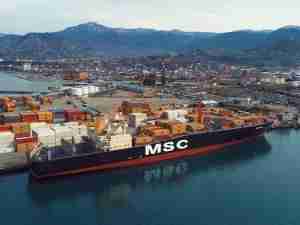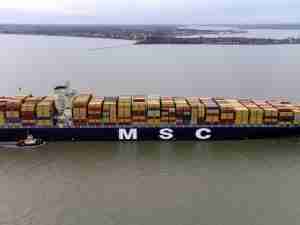"My district and the Great Lakes region are directly impacted by the Harbor Maintenance Tax (HMT)," stated Rep. Tubbs Jones. "The HMT presents a disincentive to businesses interested in moving their cargo via waterway, forcing them to, instead, move their cargo by road. Congested highways hinder the flow of commerce and create a drag on the economy, constraining growth. Furthermore, the trade relationship between the U.S. and Canada is impacted greatly by the HMT. The State of Ohio earns $15.5 billion annually through trade with Canada. Because Canada is Ohio's most important trading partner, it is important to address transportation challenges in this trade relationship.
"As a result of these problems, I introduced H.R. 5889, the Great Lakes Short Sea Shipping Enhancement Act of 2006, with my colleague Congressman Phil English, who represents Erie, Pennsylvania, and its port. This bipartisan legislation is designed to improve the efficiency of commerce in the Great Lakes region and ports.
"H.R. 5889 would provide a narrow exemption to the HMT for the movement of non-bulk commercial cargo between U.S. ports on the Great Lakes, and between Canadian and US ports on the Great Lakes. This will encourage the development of new shipping services on the Great Lakes, boosting the economic vitality of the region. A ferry service with just three crossings a day has the potential to remove 40,500 truck movements per year off the highway system, reducing wear and tear on our roads."
"The Cleveland-Cuyahoga County Port Authority commends Rep. Tubbs Jones for her efforts to remove the HMT as an obstacle to cross lake shipping and our proposed ferry service to Ontario. Her testimony before the Ways and Means Committee today was critical in moving this important legislation forward and focusing Congressional attention on it. Rep. Tubbs Jones' work on the HMT continues to be crucial to the ferry and the future economic development of Cleveland," said Gary Failor, President of the Cleveland- Cuyahoga Port Authority.
The legislation would create a win-win situation for the public and private sectors. The legislation would:
' Clear the way for new shipping services to be offered on the Great Lakes, creating jobs in the maritime sector;
' Enable commerce to flow more efficiently by offering trucks alternatives to congested highways;
' Reduce the amount of wear and tear on the region's roads by offering trucks alternatives to congested highways;
' Reduce air emissions and improve air quality by diverting trucks off congested highways.
Specific benefit to the Cleveland region
A recent study concluded that running a ferry service between Cleveland, Ohio and the Greater London Area of Ontario Canada is feasible as a profitable venture. There is a strong market demand for the proposed ferry service. The project would employ two vessels, one based in Cleveland and one in Canada. The proposed ferry service could transport 250,000 passengers, 42,000 vehicles and 25,000 trucks annually between Cleveland and Port Stanley, Ontario.
This ferry service has the potential to accommodate significant numbers of both cargo and passengers. The Great Lakes Short Sea Shipping Enhancement Act would make the ferry service an economically viable option for those interested in moving cargo efficiently between the US and Canada. The jobs created by the ferry service, including new shore-side jobs, as well as the possibility of increased tourism and trade in the area, could prove a significant economic boon t








